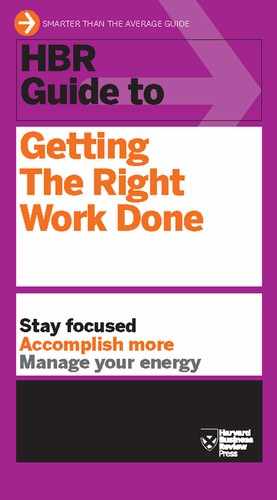Chapter 10
Stop Multitasking
by Peter Bregman
During a conference call with the executive committee of a nonprofit board on which I sit, I decided to send an e-mail to a client.
I know—multitasking is dangerous.
But I wasn’t texting while driving. I was safe at my desk. What could go wrong?
Well, I sent the client the message. Then I had to send him another one, this time with the attachment I’d forgotten to append. Finally, my third e-mail to him explained why that attachment wasn’t what he was expecting. When I eventually refocused on the call, I realized I hadn’t heard a question the board’s chair had asked me.
I swear I wasn’t sleep-deprived or smoking anything. But I might as well have been. A study showed that people distracted by incoming e-mail and phone calls saw a 10-point drop in their IQs. What’s the impact of 10 points? The same as losing a night of sleep. More than twice the effect of smoking marijuana.
Doing several things at once is a trick we play on ourselves, thinking we’re getting more done. In reality, our productivity decreases by as much as 40%. We don’t actually multitask. We switch-task, shifting rapidly from one thing to another, interrupting ourselves, and losing time in the process.
You might think you’re different, that you’ve done it so much you’ve become good at it.
But research shows that heavy multitaskers are less competent at doing several things at once than light multitaskers. Unlike most things, the more you multitask, the worse you are at it. Practice, in this case, works against you.
I decided to try an experiment. For one week I would do no multitasking and see what happened. What techniques would help? Could I sustain a focus on one thing at a time for that long?
For the most part, I succeeded. If I was on the phone, I did nothing but participate in the conversation. In meetings, I was fully focused on the presentation or discussion at hand. And when I was working at my desk, I held off any interruptions—e-mail, a knock on the door—until I finished my task.
I discovered six things:
- It was delightful. When I shut off my cell phone I was much more deeply engaged and present. While it may seem that thumbing out a text under the table during a meeting takes only a split second, it’s a longer distraction than that. First you think about your text, then you type it out, then you think about how the other person might respond, then you check for her response, etc. Before you know it, you’ve missed the whole meeting.
- I made significant progress on challenging projects. Activities like writing or strategy work require thought and persistence. They’re the kind I usually try to distract myself from. I stayed with each project when it got hard, and I experienced a number of breakthroughs.
- My stress level dropped dramatically. Multitasking isn’t just inefficient, it’s stressful. It was a relief to focus on only one thing at a time. It felt reassuring to completely finish a task before moving to the next.
- I had no patience for wasted time. I became laser-focused on getting things done. An hour-long meeting seemed interminable. A meandering conversation was excruciating.
- I had tremendous patience for useful and enjoyable things. When I was on a call with a client, I closed my computer, shut my eyes, and focused completely. I was able to pick up nuance and subtle emotion. And when I was brainstorming about a difficult problem, I stuck with it. Nothing else was competing for my attention, so I was able to settle into the one thing I was doing.
- There was no downside. I lost nothing by not multitasking. No projects were left unfinished. No one became frustrated with me for not answering a call or failing to return an e-mail the second I received it.
So how do we resist the temptation to multitask?
Turn off interruptions
Often I write at 6 AM, when there’s nothing to distract me. I shut down my computer’s wireless connection and turn off my phone. In my car, I leave my phone in the trunk. Drastic? Maybe. But most of us shouldn’t trust ourselves.
Prioritize
Say you’re the only person with information that your team needs in order to move forward with a time-sensitive project, but you’re on an important conference call. What do you do? Decide which task is more important to focus on and ask the other one to wait. Making a conscious choice to interrupt one task for another is better than trying to do them at the same time. So either excuse yourself from the conference call for a moment, or tell your team to wait until you’re done.
Use your loss of patience to your advantage
Create unrealistically short deadlines. Cut all meetings in half. Give yourself a third of the time you think you need to accomplish something.
There’s nothing like a deadline to keep things moving. And when things are moving fast, we can’t help but focus on them. If it turns out you only have 30 minutes to finish a presentation you thought would take an hour, are you really going to answer your cell phone?
Because multitasking is so stressful, single-tasking to meet a tight deadline will actually reduce your stress. And giving yourself less time to do things may make you even more productive and relaxed.
____________
Peter Bregman is a strategic adviser to CEOs and their leadership teams. His latest book is 18 Minutes: Find Your Focus, Master Distraction, and Get the Right Things Done.
______________
Adapted from content posted on hbr.org on May 20, 2009.
